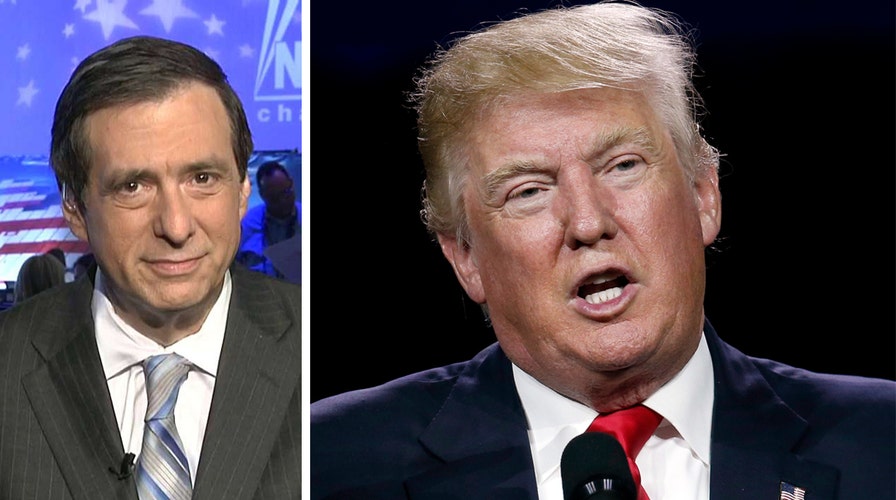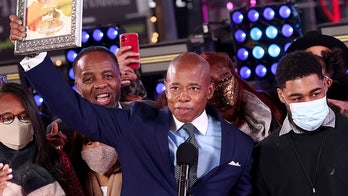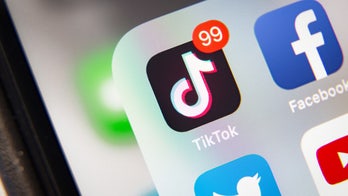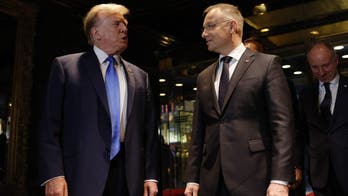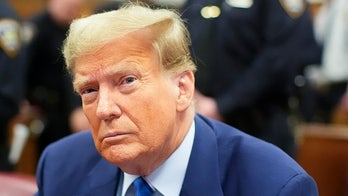Kurtz: Media's negative oppo dump on Trump
'MediaBuzz' host Howard Kurtz reacts to the media's welcoming of Trump to Cleveland with a barrage of unflattering stories
In welcoming Donald Trump to Cleveland, the media are serving up a smorgasbord of unflattering stories.
There is, of course, some meat-and-potatoes stuff about what to expect at the Republican convention and all that. But there are also appetizers and entrees spiced with that pungent anti-Trump flavor.
The theme is that this is a presidential nominee unlike any other--which is true--and therefore worthy of special treatment.
And special doubts.
The Washington Post has a long piece on how the billionaire has little time for books:
“Trump, poised to become the first major-party presidential nominee since Dwight Eisenhower who had not previously held elected office, appears to have an unusually light appetite for reading.”
Not even presidential biographies.
The New Yorker’s Jane Mayer has a lengthy interview with Tony Schwartz, the ghostwriter on “The Art of the Deal,” who says he wrote the whole thing and that Trump has an amazingly short attention span.
Having sold out (by his own admission) and done it for money (half the $500,000 advance for the 1987 book, followed by half the millions in royalties), Schwartz now wants to clear his conscience:
“I put lipstick on a pig. I feel a deep sense of remorse that I contributed to presenting Trump in a way that brought him wider attention and made him more appealing than he is.” He went on, “I genuinely believe that if Trump wins and gets the nuclear codes there is an excellent possibility it will lead to the end of civilization.”
See? This is a high-stakes election. The end of civilization and all that.
“If he were writing ‘The Art of the Deal’ today, Schwartz said, it would be a very different book with a very different title. Asked what he would call it, he answered, ‘The Sociopath.’”
Not that he’s biased against Trump or anything.
New York Times media columnist Jim Rutenberg says it’s time for the press to get more aggressive in facing a convention where “some of it promises to border on spectacle, to put it mildly. (Let me repeat: Among the potential themes is Mr. Clinton’s sex life.)
“It could be one of those events that we look back on as a defining moment in American media, especially for the television networks: Did they once again this year hand themselves over to a Trumpian infomercial - the ultimate Trump infomercial — and bask in the ratinginfs?
“Or did they rediscover their vital role of providing context, perspective and truth in a contest that is not a countdown-clock-worthy sporting event or reality show, but a competition for the presidency of the United States in fraught and dangerous times?”
Sorry, but yielding to a Trump infomercial doesn’t account for all the critical reporting, harsh commentary and (some) tough interviews. Or Trump’s willingness to submit to endless interviews even in the midst of damaging controversies, whether self-inflicted or not, while other candidates turned down endless invitations.
Politico writes the following story for at least the third time, saying GOP insiders are “dreading” the Trump convention.
And Trump doesn’t get much solace from the conservative media. The Weekly Standard, led by #NeverTrump guy Bill Kristol, sees his campaign crashing and burning:
“These leaders are political pros who understand how bad Trump's fundraising is, who have access to the best polling data, and whose careers depend on reading the pulse of the people. Better than anybody else, they know that a Trump nomination likely means a Clinton victory in November.
“With that in mind, it's time for conservatives to ask themselves some difficult questions, above all: What is the point of the Republican party anymore?”
Trump is transforming the Republican Party, which was ripe for a transformation after years of losing presidential elections—but that doesn’t please defenders of the old order.
So lots of negativity for The Donald. We'll see whether Hillary Clinton gets remotely comparable treatment on the eve of her Philadelphia convention.
